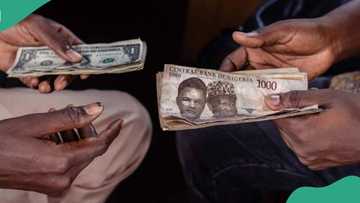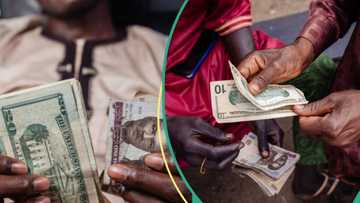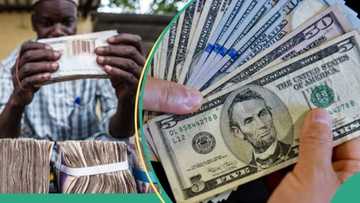Naira Crashes by N155/$ as Dollar Supply Falls by 30% in Official Markets
- Recent data from official sources has shown that the naira continued its decline in the market
- The supply of the local currency declined by 30% as demand outweighed the supply of the naira
- On the parallel market, however, the naira remained constant at N1,480/$ against the dollar
Legit.ng journalist Zainab Iwayemi has over three years of experience covering the Economy, Technology, and Capital Market.
The local currency continued its dip against the US dollar in the official market on Thursday, May 30.

Source: Getty Images
Data by from FMDQ securities showed that at the Nigerian Autonomous Foreign Exchange Market (NAFEM), the official market showed that the naira closed at N1484.75 to a dollar.
This means a significant loss compared to the N1329.65/$ it closed on Wednesday, May 29, 2024.
The amount represents an 11.7% decline or N155/$ within 24 hours, depicting the futility of the recent efforts by the CBN.
Dollars supplied by interested sellers and ready purchasers fell by 30.05% on Thursday, from $336.54 million on Wednesday to $235.41 million.
According to the FX auction summary, the intraday high closed at N1,520 per dollar on Thursday, down from the stated N1,506/$1 on Wednesday.
Additionally, the intraday low dropped to N1,100, which was less than the N1,010 that was traded on Wednesday.
On Thursday, the naira ended the day at N1,480, unchanged at the parallel market, sometimes referred to as the black market.
The Central Bank of Nigeria's (CBN) policies and interventions have not stopped the local currency's depreciation in the foreign exchange market.
Samuel Oyekanmi, a research and insight associate with Norrenberger Financial Group explained that the naira seem to have found price discovery around the region of N1,400 to N1,500 to a dollar.
He said,
"We still witness low FX inflows in terms of capital importation although we have seen FPI increase in the Nigerian money market in recent time, however we have also noticed significant FPI outflow in the equities market almost suggesting a trade off.
"We still do not export many things of substance and still import almost everything in the country. The only solution for our dear naira will lie in improved location production, increased trade activities, better business environment to encourage FDIs amongst other policies."
Legit.ng reported that in the nine months from January to September 2023, the apex bank's dollar supply for overseas medical and educational costs increased by 49.22% to $1.81 billion.

Read also
New exchange rate as naira value rises against US dollar in black market, falls in official market
According to CBN data, Nigeria spent somewhat more on international education and health-related concerns abroad in 2023—$1.81 billion compared to $1.76 billion spent at the same time in 2022.
Report shows drop in forex demand
Legit.ng also reported that the demand for foreign exchange by individuals and companies engaged in importation and other forex-related activities decreased by 42% year-on-year.
The total sectoral utilisation of foreign exchange indicated that 19 sectors and services received $21.12 billion in forex allocations in 2023.
This represented a 41.9% decline, or $8.87 billion, compared to the $29.98 billion allocated in 2022.
Proofreading by James Ojo Adakole, journalist and copy editor at Legit.ng.
PAY ATTENTION: Unlock the best of Legit.ng on Pinterest! Subscribe now and get your daily inspiration!
Source: Legit.ng




